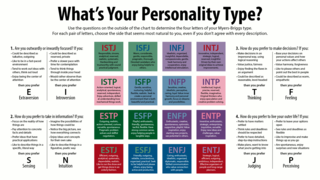Self-Esteem
Are Gen Z'ers Too in Touch With Their Feelings?
How the self-esteem movement taught children to be overwhelmed by their feelings
Posted August 16, 2020 Reviewed by Hara Estroff Marano
As I sit down to write this post, I don't have a singular message in mind but rather a loose set of observations and questions that I hope hang together in the end. Last semester, in an effort to get my freshmen writing students engaged in personal reflection type writing, I asked them to take the quick and dirty version of the Myers Briggs personality test on a website called 16personalities.com and then write an open-ended reflection on their test results: what they learned about themselves or how the test confirmed what they already knew about themselves. Also fair game was an argument for why they found the test to be BS, and I got two great essays in this vein. I suggested they focus on one or two aspects of the personality assessment just for the sake of ease (e.g., career goals, intimate relationships, work style, strengths and weaknesses, friendships, etc.).
Some essays were very insightful, such as one where the author asked his girlfriend to also take the personality test and they discovered they had very similar profiles and argument styles, which shed light for the couple on why they kept having the same argument over and over (and hopefully gave them some direction in escaping the vicious cycle).

For readers unfamiliar with the Myers Briggs test, it assesses people along four continuums: introversion and extroversion (where you focus your attention); intuition or sensing (the way you take in information); thinking or feeling (how you make decisions); and judging or perceiving (how you deal with the world).
I’m no expert on the MB test, but every website I went to suggested that the breakdown of feelers and thinkers in the general population should be about 50/50. So I was surprised by one facet of the results from my 40 students who took the test: only one female student tested as a thinker; the other 39 students tested as feelers. How could this be? I started thinking (I’m an ENTJ/ENTP and thinking is what we do…).
I wondered if there was a link between this fact (97.5% of my students testing as feelers rather than the predicted average of around 50%) and the extreme rise in diagnoses of anxiety and depression in Gen Z, which I explored in my last few posts here. Several of the concepts I explored in these posts, such as what I called “borrowed trouble” (when Gen Z’ers suffer anxiety as a result of others’ troubles) seemed to result from Gen Z’ers caring too much, rather than not enough, or not at all—I’m thinking of the stereotypical Gen X or millennial teenager who didn’t give a bleep about anyone or anything.
There was a strong push in the 1990s and beyond to raise the self-esteem of children regardless of both children’s actual efficacy and the effectiveness of the social movement itself. Sentiments of this movement, explored by Jean Twenge, Julie Lythcott-Haims, Greg Lukianoff and Jonathan Haidt, included, for example, “trust your feelings,” “if you believe it, you can do it,” “words can damage you,” “accept yourself just as you are,” “if it feels right, it is,” which collectively, some argue, have gotten into us our current predicament of college students who demand trigger warnings for potentially upsetting topics, safe spaces to escape to, and the presumed right to cancel speaker events on campus that might make them uncomfortable.
The distinction between thinkers and feelers is not discrete; people tend to be notably one or the other but all people have thoughts and feelings. For instance, I consistently test around 80% thinker, and the remainder as feeler. This doesn’t mean that I have less feeling than most people (although, to be honest, how would I know?); it suggests that I have a strong tendency to make decisions based on reasoning, logic, and thinking rather than on feelings, hunches, or current mood.
If the self-esteem movement worked, we would expect to see a much greater tendency in our just-now-becoming-adult population toward making decisions based on feeling rather than on thinking. Being overly in touch with feelings at the expense of thinking could account for why Gen Z’ers often report feeling overwhelmed by their problems to a greater extent than previous generations.
The perceived need for safe spaces and trigger warnings can only come from a place of feeling—specifically, wanting to feel safe and wanting others to feel safe. From what, you might ask? From topics and issues that might cause discomfort, anger, embarrassment, fear, etc. But a major function of education, especially college education, is the ability to feel these emotions, see them in action in the classroom and on college campus, and in late-night dorm room discussions, and be able to think them through, respecting others’ opinions even if you hate them. In short, it’s the ability to have an adult conversation. Shutting down these conversations might save people from hurt feelings, but it also stunts intellectual growth like a blunt force instrument to the head.
It’s healthy to be in touch with one’s feelings, but I think the current predicament Gen Z finds itself in (with record-breaking rates of anxiety and depression and a very strong commitment to the idea that these maladaptive ills are justified by what’s out there in the world) is a result of being overly in touch with one’s feelings at the expense of one’s critical thinking skills. And the current political climate, whether coincidentally or not, mirrors this predicament.
The self-esteem movement drew lots of criticism for good reason. It "worked," but ultimately it backfired. We can’t feel our way through the world like children with no ego, and we can’t think our way through the world like heartless automatons. I’m excited to see campus life 2.0, post-COVID, post-2020 election, the next generations embodying "heart and mind united" in balance, open-minded thinkers willing to come out of the safe spaces and take on the hard problems with grace and respect. We’re going to need that.
References
Jean Twenge's homepage: http://www.jeantwenge.com/books/
Lukianoff, Greg, and Jonathan Haidt. "THE CODDLING OF THE AMERICAN MIND: HOW GOOD INTENTIONS AND BAD IDEAS ARE SETTING UP A GENERATION FOR FAILURE." Phi Kappa Phi Forum, vol. 99, no. 1, 2019, p. 28+. Gale Academic OneFile, Accessed 16 Aug. 2020.
Lythcott-Haims, J. (2015). How to raise an adult: Break free of the overparenting trap and prepare your kid for success. Henry Holt and Co.




